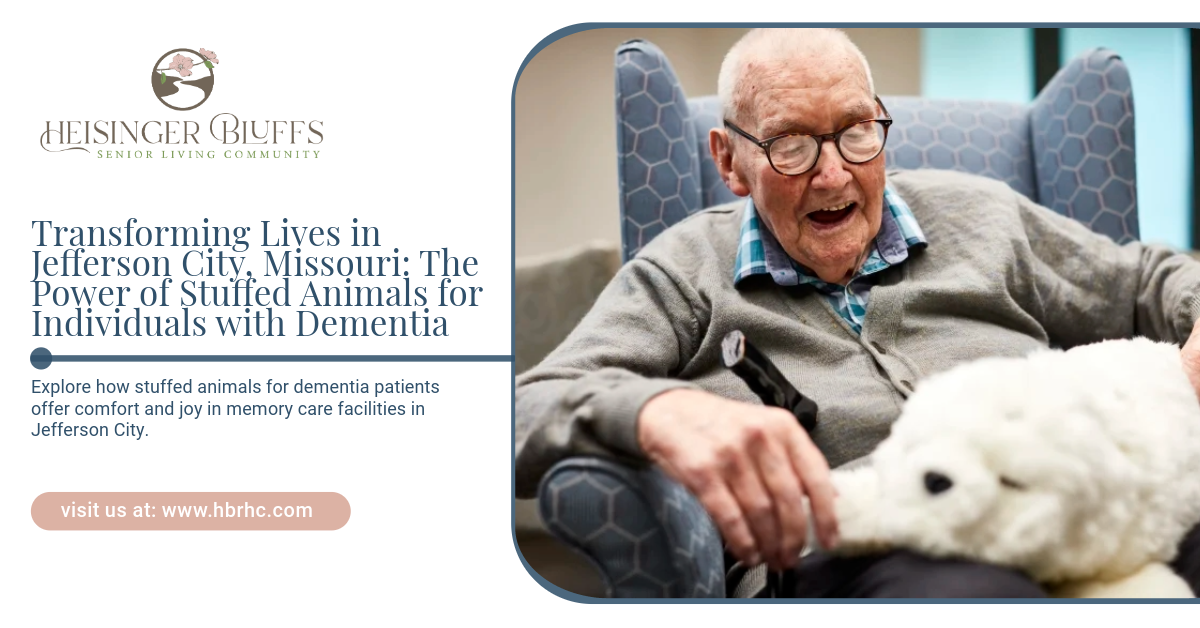Transforming Lives in Jefferson City, Missouri: The Power of Stuffed Animals for Individuals with Dementia

Key Highlights
- Stuffed animals provide a comforting object to hold, which can have a calming effect. The act of holding or petting a stuffed animal can promote relaxation, similar to how people may calm down by stroking a pet.
- In later stages of dementia, individuals may become withdrawn and less likely to engage with others. Stuffed animals can help reintroduce a sense of interaction and companionship.
- Stuffed animals can evoke memories of the past, which can be especially meaningful for individuals with dementia. For many older adults, stuffed animals may bring back memories of their own childhood or of taking care of their children or grandchildren.
- Caring for a stuffed animal can also give dementia patients a renewed sense of purpose. Often, individuals with dementia feel a loss of control as their independence diminishes.
- Weighted stuffed animals have become popular for their ability to provide sensory input. The extra weight can mimic the sensation of holding a pet, adding a calming effect.
Dementia is a challenging condition that affects not only memory but also the emotional well-being of individuals. For caregivers and family members, finding ways to bring comfort and reduce anxiety for loved ones living with dementia can be overwhelming. However, one simple yet powerful tool that has gained increasing attention is the use of stuffed animals.
In Jefferson City, Missouri, caregivers and dementia care professionals are discovering the therapeutic value of stuffed animals in transforming the lives of those with dementia. These soft, comforting companions offer more than just a distraction; they can significantly enhance emotional well-being, reduce anxiety, and even trigger joyful memories.
In this article, we will explore the benefits of stuffed animals for dementia patients, how they can improve quality of life, and what caregivers should consider when choosing these therapeutic companions for their loved ones.
Understanding Dementia and Emotional Needs
Dementia is a broad term for conditions that cause a decline in cognitive function, affecting memory, thinking, and social abilities. One of the most distressing aspects of dementia for patients is the emotional confusion that often accompanies memory loss. They may feel anxious, scared, or even agitated when they cannot remember faces, places, or daily tasks.
These emotions can be difficult for caregivers to manage, but providing comfort through sensory and emotional stimulation is a highly effective method for easing anxiety. Stuffed animals can serve as a source of tactile and emotional comfort, offering a non-judgmental companion for individuals who may be struggling with feelings of loneliness, fear, or confusion.
The Therapeutic Value of Stuffed Animals for Dementia Patients
Stuffed animals can be a powerful therapeutic tool for individuals with dementia. The soft texture, familiar form, and gentle weight of these plush toys can have profound effects on both the emotional and physical well-being of patients.
1. Reducing Anxiety and Agitation
Dementia patients often experience heightened anxiety, particularly when they feel lost or disoriented. Stuffed animals provide a comforting object to hold, which can have a calming effect. The act of holding or petting a stuffed animal can promote relaxation, similar to how people may calm down by stroking a pet.
Studies have shown that tactile stimulation—touching or hugging soft objects—can lower cortisol levels, the hormone responsible for stress, and increase the release of oxytocin, which promotes feelings of happiness and calm.
2. Encouraging Engagement and Interaction
In later stages of dementia, individuals may become withdrawn and less likely to engage with others. Stuffed animals can help reintroduce a sense of interaction and companionship. Patients may talk to the stuffed animal, take care of it, or simply hold it for comfort.
Stuffed animals can also help foster connections between dementia patients and their caregivers. Caregivers can introduce the stuffed animal as a "friend" that the patient can look after, encouraging nurturing behaviors and creating moments of joy and engagement.
3. Triggering Memories and Positive Emotions
Stuffed animals can evoke memories of the past, which can be especially meaningful for individuals with dementia. For many older adults, stuffed animals may bring back memories of their own childhood or of taking care of their children or grandchildren. These positive associations can help stir long-term memories, even in individuals with advanced dementia.
When familiar objects like stuffed animals are used, they can also evoke a sense of comfort and nostalgia. For example, a patient who once had a beloved pet may find great comfort in holding a stuffed dog or cat.
4. Providing a Sense of Purpose
Caring for a stuffed animal can also give dementia patients a renewed sense of purpose. Often, individuals with dementia feel a loss of control as their independence diminishes. By giving them a task—such as looking after a stuffed animal—caregivers can help them regain a feeling of responsibility and pride.
Some caregivers have even noted that individuals with dementia begin to treat their stuffed animals like pets, which gives them a routine and a meaningful activity to focus on throughout the day.
Types of Stuffed Animals for Dementia Care
Not all stuffed animals are created equal when it comes to their therapeutic benefits for dementia patients. Here are some types of stuffed animals that are especially useful for dementia care:
1. Weighted Stuffed Animals
Weighted stuffed animals have become popular for their ability to provide sensory input. The extra weight can mimic the sensation of holding a pet, adding a calming effect. This deep pressure can be soothing for individuals with dementia who may feel restless or agitated.
Benefits:
- Provides a comforting sense of security.
- Mimics the feeling of holding a real animal or object.
- Helps reduce agitation and restlessness.
2. Stuffed Animals with Realistic Features
For patients who miss the companionship of a pet, realistic stuffed animals (such as those resembling cats or dogs) can provide emotional comfort. These stuffed animals can even come with lifelike features, such as a purring mechanism or soft fur, to further enhance the calming experience.
Benefits:
- Brings back memories of pets.
- Encourages nurturing and caregiving behaviors.
- Helps trigger long-term memories and positive emotions.
3. Interactive Plush Toys
Some interactive stuffed animals are designed to respond to touch or sound, making them an engaging option for dementia patients. For example, certain robotic stuffed animals may purr, meow, or wag their tails, providing a more lifelike interaction for the individual.
Benefits:
- Engages the senses through sound and movement.
- Promotes social interaction and reduces isolation.
- Offers an interactive companion without the responsibilities of a real pet.
How to Choose the Right Stuffed Animal for Your Loved One
When selecting a stuffed animal for a loved one with dementia, it’s important to consider their personal preferences, cognitive abilities, and emotional needs. Here are some tips to help you choose the right one:
1. Consider Their Favorite Animals or Toys
Does your loved one have a history of owning pets or enjoying specific types of toys? If so, you may want to choose a stuffed animal that resembles a pet they once had or a toy they enjoyed in their younger years.
2. Pay Attention to Texture and Weight
Look for stuffed animals that have a pleasant texture—soft, plush, and gentle on the skin. Weighted stuffed animals can be particularly beneficial for those who seek physical comfort, as the added weight helps provide a soothing effect.
3. Choose an Appropriate Size
Make sure the stuffed animal is a manageable size for the individual to hold and carry. A stuffed animal that is too large or heavy may be difficult for someone with limited strength or mobility to manage.
4. Opt for Interactive Features if Appropriate
If your loved one enjoys sensory stimulation, consider an interactive stuffed animal with features like sound, purring, or movement. These features can help provide a more engaging experience, especially for patients who may be feeling isolated or disengaged.
The Emotional Impact on Caregivers
The use of stuffed animals in dementia care not only benefits the patients but also positively affects caregivers. Watching their loved ones find comfort and joy in these soft companions can bring a sense of relief and happiness to caregivers. For some, it also helps bridge the gap when verbal communication becomes difficult, offering a way to connect emotionally without words.
Caregivers can introduce stuffed animals as a routine part of daily care, integrating them into moments when the dementia patient may feel anxious or agitated. The stuffed animals can also serve as a tool to help establish calming bedtime routines, reducing stress for both the patient and the caregiver.
Final Thoughts
In Jefferson City, Missouri, caregivers are embracing the power of stuffed animals as an effective tool for enhancing the emotional and cognitive well-being of individuals with dementia. These comforting companions provide more than just soft, cuddly support—they offer peace, engagement, and a sense of purpose.
At Heisinger Bluffs, we believe in creating a nurturing environment that supports the emotional needs of our residents. Our community offers various activities and tools, including the use of therapeutic stuffed animals, to promote well-being for individuals with dementia. If you’d like to learn more about how we can support your loved one, please contact us today.
Frequently Asked Questions
Are stuffed animals suitable for all dementia patients?
Yes, stuffed animals can provide comfort and emotional support for individuals at all stages of dementia, although the type of stuffed animal may vary based on the individual’s cognitive abilities and personal preferences.
How do I know if a weighted stuffed animal is right for my loved one?
Weighted stuffed animals are particularly beneficial for individuals who experience anxiety or agitation, as the added weight offers a calming effect. If your loved one enjoys holding or hugging objects, a weighted stuffed animal may be a great option.
Can stuffed animals replace real pets for dementia patients?
While stuffed animals cannot completely replace the companionship of real pets, they can provide similar emotional comfort without the responsibilities of pet ownership. This makes them a safer option for individuals with dementia who may not be able to care for a real animal.
Sources:
- https://www.alz.org/alzheimers-dementia/what-is-dementia
- https://www.researchgate.net/publication/224055874_Animal-shaped_toys_as_therapeutic_tools_for_patients_with_severe_dementia
- https://pmc.ncbi.nlm.nih.gov/articles/PMC6427954/
- https://pmc.ncbi.nlm.nih.gov/articles/PMC9216399/
- https://alzheimersdisease.net/living/stuffed-animals-coping











